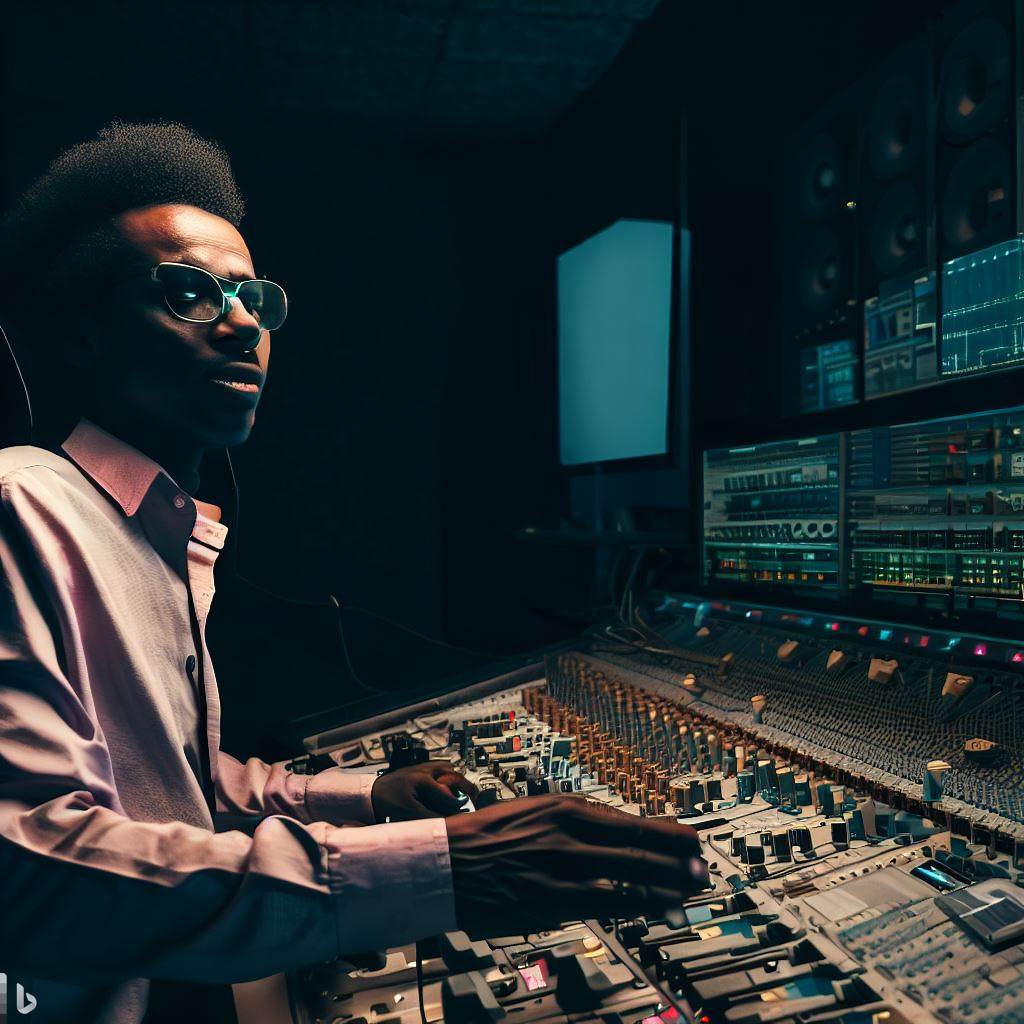Introduction
Mentorship is essential in the field of mixing engineering in Nigeria, it plays a crucial role in developing skills and enabling individuals to reach their full potential.
In this blog post, we will explore the significance of mentorship and how it contributes to the growth of talent in this industry.
By providing guidance and support, mentors can help aspiring mixing engineers navigate the complexities of the profession.
Mentorship offers a unique opportunity for novices to learn from experienced professionals, gaining valuable insights and practical knowledge.
Through mentorship, aspiring mixing engineers can receive personalized feedback, allowing them to identify areas of improvement and refine their skills.
Mentors act as role models by showcasing best practices, professionalism, and dedication to their craft.
Furthermore, mentorship fosters a sense of community and collaboration in the field, encouraging knowledge sharing and the exchange of ideas.
This creates an environment where talent can thrive and innovation can flourish.
The purpose of this blog post is to shed light on the crucial role mentorship plays in developing talent in the field of mixing engineering in Nigeria.
By emphasizing the importance of mentorship, we hope to inspire both aspiring mixing engineers and experienced professionals to actively engage in mentorship initiatives.
In subsequent sections, we will delve deeper into specific examples of successful mentorship programs and share insights from mentors and mentees in the industry.
Stay tuned for an enriching exploration of mentorship in the world of mixing engineering in Nigeria.
Definition of Mixing Engineering
Mixing engineering refers to the process of combining and balancing multiple audio tracks to create a final mix in the music industry.
It involves adjusting levels, panning, equalization, and effects to achieve a desired sound.
Why is Mixing Engineering a Significant Field in the Music Industry?
- Mixing engineering plays a crucial role in shaping the overall sound and quality of a music production.
- It helps bring out the best in each instrument and vocals, ensuring that they blend well together.
- A well-mixed track enhances the listening experience and captivates the audience.
- It can make or break a song, as even the most talented musicians and artists rely on mixing engineers to polish their work.
- Mixing engineers have the power to transform raw recordings into professional, radio-ready tracks.
Successful Mixing Engineers in Nigeria
- Michael “Don Jazzy” Ajereh – Don Jazzy is a renowned Nigerian music producer and mixing engineer. He has worked with top artists in the Nigerian music industry, such as D’banj, Wande Coal, and Tiwa Savage.
- Oscar Heman-Ackah – Oscar is a prolific mixing engineer based in Nigeria. He has worked with notable artists like Burna Boy, Davido, and Wizkid, contributing to the success of their albums and hit songs.
- Temidayo “Pheelz” Oni – Pheelz is a talented music producer and mixing engineer. He has crafted exceptional mixes for artists like Olamide, Adekunle Gold, and Teni, earning him recognition and respect within the industry.
- Bolaji “B Banks” Bello – B Banks is a skilled mixing engineer who has collaborated with numerous Nigerian artists, including Olamide, Reminisce, and Lil Kesh. His expertise in mixing has contributed to the success of many hit songs.
- Joseph “Joey Dafidi” Udofia – Joey Dafidi is an accomplished sound engineer and mixing engineer from Nigeria. He has worked with prominent Nigerian artists like Burna Boy, M.I Abaga, and Asa, delivering exceptional mixes that have garnered critical acclaim.
To summarize, mixing engineering is a vital aspect of the music industry that involves combining and balancing audio tracks to create a final mix.
Transform Your Career in Nigeria
Discover unmatched expertise with our personalized Career Consulting service. Navigate Nigeria’s job market with a strategy tailored just for you.
Get StartedIt is instrumental in shaping the overall sound and quality of a music production, and talented mixing engineers in Nigeria, such as Don Jazzy, Oscar Heman-Ackah, Pheelz, B Banks, and Joey Dafidi, have successfully contributed to the success of many artists and songs.
Read: Internationally Recognized Nigerian Mixing Engineers: A Profile
The Importance of Talent Nurturing
The significance of nurturing talent in the context of mixing engineering
Nurturing talent is of immense significance in the context of mixing engineering.
Experienced mixing engineers can provide mentorship to aspiring professionals, guiding them in their career.
This mentorship goes beyond technical skills and encompasses valuable industry insights and knowledge.
How mentorship can contribute to the growth and development of aspiring mixing engineers in Nigeria
By learning from experienced mentors, aspiring mixing engineers can avoid common pitfalls and accelerate their growth.
Through mentorship, young engineers can also build a strong network of industry connections. Mentors can introduce them to potential clients and collaborators, opening doors for their career.
Moreover, mentorship can help aspiring mixing engineers develop a unique artistic style and sound. Mentors can inspire them to experiment with different techniques and approaches to mixing.
They can encourage them to think creatively and push boundaries, ultimately leading to innovation in the field.
Potential impact of talent nurturing on the Nigerian music industry as a whole
Nurturing talent in mixing engineering can have a significant impact on the Nigerian music industry.
As more skilled and knowledgeable mixing engineers emerge, the overall quality of music production will improve.
Better mixing can enhance the listening experience, making Nigerian music more appealing to a global audience.
With mentorship, talented individuals can overcome obstacles and reach their full potential. They can contribute their unique perspectives and skills to the industry, enriching the diversity of Nigerian music.
Nurturing talent in mixing engineering can also help to create a sustainable ecosystem for the industry.
By investing in mentorship programs, the music industry can ensure a steady supply of skilled professionals.
This, in turn, will attract more investments and opportunities for growth in the sector.
Furthermore, mentorship can help to preserve and pass on the knowledge and expertise of experienced mixing engineers.
It ensures that the valuable lessons learned from years of practice are not lost but are transferred to the next generation.
Mentorship also fosters a sense of community and camaraderie among mixing engineers in Nigeria. They can learn from each other, collaborate on projects, and collectively raise the bar for the industry.
In short, talent nurturing is crucial in the context of mixing engineering in Nigeria. Mentorship plays a vital role in the growth and development of aspiring mixing engineers.
It has the potential to make a significant impact on the Nigerian music industry as a whole.
By investing in mentorship programs, the industry can ensure a vibrant and prosperous future for mixing engineering in Nigeria.
Read: How Nigerian Journalists are Shaping Policy
Benefits of Mentorship in Mixing Engineering
When it comes to the field of mixing engineering, having a mentor can be invaluable.
Publish Your Professional Profile, Business or Brand
Showcase your expertise, gain trust, and boost visibility instantly on Professions.ng.
Publish NowMentorship not only provides guidance, knowledge, and industry insights but also opens up doors of opportunities for aspiring professionals.
In Nigeria’s mixing engineering scene, several success stories have emerged from the mentorship relationship.
Let’s explore the various benefits of having a mentor in this field.
Expert Guidance
- A mentor in mixing engineering can offer expert guidance, helping mentees navigate the complexities of the profession.
- They can provide insights on industry trends, best practices, and the latest technologies.
- Mentors can advise mentees on how to improve their technical skills and refine their craft.
Knowledge and Experience
- Mentors have valuable knowledge and experience acquired over years of working in the field.
- They can share practical tips, tricks, and techniques to enhance the mixing engineering process.
- Mentees can learn from the mistakes and successes of their mentors, saving them from unnecessary setbacks.
Networking Opportunities
- Through mentorship, mentees can gain access to a mentor’s network, which can be instrumental in their career advancement.
- Mentors can introduce mentees to industry professionals, potential clients, and collaborators.
- Networking opens doors to new opportunities, such as projects, internships, and job placements.
Building Confidence and Self-Esteem
- Having a mentor who believes in their potential can boost a mentee’s confidence and self-esteem.
- Mentors provide constructive feedback, helping mentees identify their strengths and areas for improvement.
- Positive reinforcement from mentors can inspire mentees to strive for excellence and overcome self-doubt.
Emotional Support and Motivation
- Mentorship relationships often extend beyond professional guidance, offering valuable emotional support.
- Mentors can empathize with mentees’ challenges and provide encouragement during difficult times.
- They can motivate mentees to stay focused, persevere through obstacles, and pursue their goals.
Success Stories: Mentorship in Nigeria’s Mixing Engineering Scene
In Nigeria, numerous mentees have reaped the benefits of mentorship in the field of mixing engineering. One such success story is the rise of a young mentee who struggled to find opportunities in the industry.
Through the guidance of a mentor, they learned how to market their skills effectively and connect with potential clients.
The mentor introduced them to a renowned music producer who recognized their talent and provided them with a break as a mixing engineer for a major recording project.
Another success story involves a mentee who lacked technical knowledge in certain aspects of mixing engineering.
Their mentor patiently taught them the intricacies of advanced mixing techniques and shared insider secrets for achieving high-quality sound.
As a result, the mentee’s mix became highly sought-after, opening doors to collaborations with prominent Nigerian artists.
Mentorship has proven to be a game-changer for these mentees, enabling them to overcome hurdles, develop their skills, and establish themselves as successful mixing engineers in Nigeria’s competitive music industry.
In a nutshell, mentorship plays a vital role in the field of mixing engineering.
The benefits, including expert guidance, knowledge sharing, networking opportunities, boosted confidence, and emotional support, have proven transformative for mentees.
Nigeria’s mixing engineering scene has witnessed the positive impact of mentorship through the success stories of aspiring professionals who have thrived with the guidance and support of their mentors.
Read: Mixing Engineer Contracts: Legal Aspects in the Nigerian Context

Challenges and Solutions in Nurturing Talent
Common challenges faced in finding suitable mentors for aspiring mixing engineers in Nigeria
In Nigeria, aspiring mixing engineers face certain challenges when it comes to finding suitable mentors. These challenges include:
- Lack of mentorship opportunities: There is a scarcity of experienced mixing engineers willing to mentor aspiring talents.
- Limited access to industry professionals: Mentees often struggle to connect with established mixing engineers due to a lack of networking opportunities.
- Inadequate guidance: Many mentees find it difficult to receive regular guidance and feedback from mentors.
- Financial constraints: Mentoring services can be costly, making it inaccessible for mentees with limited resources.
- Geographical limitations: The industry is concentrated in major cities, making it challenging for mentees from smaller towns to find mentors.
Potential solutions to bridge the gap between mentors and mentees
However, there are potential solutions that can bridge the gap between mentors and mentees in the Nigerian music industry:
- Mentorship programs: Establishing structured mentorship programs can provide a platform for aspiring mixing engineers to connect with experienced mentors.
- Networking events: Organizing networking events where mixing engineers and aspiring talents can interact can facilitate mentor-mentee relationships.
- Online platforms: Creating online platforms dedicated to mentorship can connect mentees with mentors regardless of geographical limitations.
- Financial support: Offering financial assistance or scholarships for mentees can help overcome the challenges of affordability.
- Professional associations: Collaborating with industry associations to promote mentorship and provide resources can enhance the ecosystem for nurturing talent.
Importance of creating a supportive ecosystem for talent nurturing in the Nigerian music industry
It is crucial to recognize the importance of creating a supportive ecosystem for talent nurturing in the Nigerian music industry.
Here’s why:
- Skills development: Mentoring provides mentees with opportunities to enhance their skills and knowledge in mixing engineering.
- Networking: Mentees can build valuable connections through mentorship, leading to future collaborations and career opportunities.
- Industry insights: Mentors can provide mentees with valuable insights into the workings of the Nigerian music industry, offering guidance on navigating challenges and seizing opportunities.
- Confidence and motivation: Mentorship fosters a supportive environment that boosts mentees’ confidence and motivation to pursue their aspirations.
- Quality control: Effective mentorship ensures the availability of highly skilled mixing engineers in the industry, contributing to the overall quality of Nigerian music.
Basically, the Nigerian music industry needs to address the challenges faced in finding suitable mentors for aspiring mixing engineers.
By implementing mentorship programs, organizing networking events, and leveraging online platforms, the gap between mentors and mentees can be bridged.
Additionally, creating a supportive ecosystem through financial support and professional associations is essential for nurturing talent in the industry.
With these efforts, Nigeria can pave the way for a thriving community of skilled and passionate mixing engineers.
Read: A Day in the Life of a Performers’ Manager in Nigeria
Case Studies
John Ojo – Mentored by Ade Adekunle
John Ojo, a talented mixing engineer in Nigeria, was fortunate to find mentorship with veteran mixer Ade Adekunle.
Under Ade’s guidance, John honed his skills and gained valuable insights into the industry. Ade shared his extensive knowledge and experience with John, teaching him techniques that elevated his mixing abilities.
Through their mentorship relationship, John learned the importance of attention to detail, effective communication, and patience in achieving excellent mixes.
As a result of this mentorship, John successfully collaborated with top Nigerian artists, gaining recognition for his exceptional mixing skills.
His career flourished, and he became a sought-after mixing engineer in the industry.
Funmi Ayodele – Mentored by Tunde Bakare
Funmi Ayodele, a young and ambitious mixing engineer, found mentorship in the well-respected Tunde Bakare.
Under Tunde’s guidance, Funmi learned not only technical skills but also the importance of professionalism in the industry.
Tunde exposed Funmi to various challenges and opportunities, allowing her to grow both personally and professionally.
He encouraged her to experiment with different mixing techniques and mentored her in developing her own unique style.
With Tunde’s support and guidance, Funmi landed projects with prominent artists and producers, earning her a reputation for creating exceptional mixes.
She attributes her success to Tunde’s mentorship, which helped her navigate the competitive landscape of mixing engineering in Nigeria.
Emmanuel Okon – Mentored by Uche Obi
Emmanuel Okon, an aspiring mixing engineer, found mentorship in the renowned Uche Obi, known for his exceptional mixing skills.
Under Uche’s tutelage, Emmanuel learned the technical intricacies of mixing engineering and developed a keen ear for sound.
Uche believed in Emmanuel’s potential and pushed him to explore different genres and experiment with unique soundscapes.
He guided Emmanuel through challenging projects, teaching him the importance of adaptability and versatility.
As a result of Uche’s mentorship, Emmanuel’s career skyrocketed. He worked on hit records and collaborated with renowned Nigerian artists.
Emmanuel credits Uche’s mentorship for his ability to consistently deliver high-quality mixes that meet the demands of the industry.
Publish Your Professional Profile, Business or Brand
Showcase your expertise, gain trust, and boost visibility instantly on Professions.ng.
Publish NowThe Impact of Mentorship on Professional Growth
The case studies above highlight the significant impact mentorship has on the professional growth of mixing engineers in Nigeria.
Mentors provide invaluable guidance, exposing mentees to industry best practices, and teaching them the skills necessary for success.
They offer real-life experiences, helping mentees navigate challenges and make informed decisions in their careers.
The role of mentors extends beyond technical expertise; they also act as motivators and sources of inspiration.
Mentees benefit from their mentors’ knowledge and experiences, gaining confidence and self-belief in their abilities.
Additionally, mentorship relationships often lead to networking opportunities, introducing mentees to potential clients and collaborators.
These connections help mentees establish their presence in the industry and open doors for further career growth.
All in all, mentorship plays a crucial role in the professional development of mixing engineers in Nigeria.
The guidance, support, and industry insights provided by mentors contribute to their mentees’ success and eventual recognition in the industry.
By sharing their wealth of knowledge and experiences, mentors empower the next generation of mixing engineers to thrive in their careers.
Conclusion
Mentoring plays a vital role in nurturing talent and promoting the growth of the mixing engineering profession in Nigeria.
Throughout this blog post, we have explored the various benefits of mentorship, such as gaining valuable industry knowledge, improving technical skills, and building a professional network.
By emphasizing the significance of mentorship, we hope to inspire readers to seek out mentoring opportunities and support the development of aspiring mixing engineers in the country.
Mentorship can provide invaluable guidance and support, helping individuals navigate their career paths and reach their full potential.
Aspiring mixing engineers should actively seek mentorship relationships with experienced professionals in the field, as this can greatly accelerate their growth and success.
Additionally, industry veterans should actively participate in mentoring programs, sharing their knowledge and experience to foster the next generation of talent.
By investing in mentorship and supporting the development of aspiring mixing engineers, we can create a thriving ecosystem of talented professionals in Nigeria.
Together, we can elevate the standards of the mixing engineering profession and contribute to the growth of the music industry as a whole.
So, whether you are an aspiring mixing engineer or an industry veteran, let us come together and embrace the power of mentorship in nurturing talent and driving the advancement of the mixing engineering profession in Nigeria.




